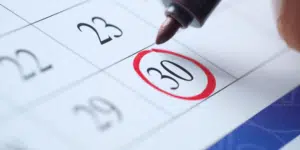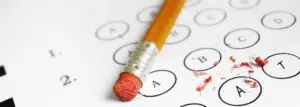Love it or hate it, the weekly spelling test is an elementary school tradition in many schools.
When first-graders bring home a spelling list for the first time, often they are thrilled to study for a real test. However, once the novelty of the experience wears off, kids aren’t as motivated to study. Most of the words are easy, but the tricky entries that dot the list can mean trouble for an unprepared student. Kids will need to review for the spelling test in order to get a good grade, but most don’t know how to prepare effectively on their own. Parents can show kids how to get ready for a test.
Change the attitude
Don’t think of a spelling test as a rote memorization exercise. Kids will say that’s boring. Trust me, it’s not just about the words. The spelling test is one of the easiest ways for your child to get a good grade and learn healthy study habits at the same time. Helping your child prepare also shows a teacher that you are an involved parent. Kids feel great when they earn good grades, which gives them confidence to apply themselves academically. All this from spelling twenty words correctly!
Start Monday
The day your child comes home with the spelling list, do a pre-test and identify trouble words. Focus primarily on the trouble spots, but sprinkle in the ones she knows for confidence’s sake. Let her practice spelling using a pen or even a Sharpie. Break the activity up into short study segments, and have her work on that exercise while you are making dinner or driving. Start with very short reviews. Comment positively on progress. Give compliments, such as “Wow, you’re a fast learner!”
Don’t wait until the day before the test
Don’t leave studying until the day before the spelling test. Yes, it will be fresh in your child’s mind, but she may not have all the tricky words memorized fully, nor will she feel as confident at test time. And don’t do the exercise where you spell the word incorrectly to see if your child can spot the error; that’s a different skill.
How to help your child study for the spelling test
Let her repeat the letters of the spelling word
Have her write out the letters in a word pyramid. Here is an example for the word “letters”:
L
LE
LET
LETT
LETTE
LETTER
LETTERS
Have her write out the words neatly
Comment on handwriting, particularly if it is neat. If your child’s handwriting is messy, pretend you can’t read a letter and have her write it again, warning your child that the teacher will be checking spelling tests very quickly and might mark it incorrect if it’s illegible.
Zero in on the trouble words with good questions
Profile trouble words to help your child learn challenging literacy skills. You might ask:
- How many letters are in the word?”
- How many vowels are in the word?
- Is there a suffix?
- What is the fifth letter?
- Does it know how to ride a bike? (Ha!)
Make her laugh
Sprinkle in a few jokes to keep your child paying attention. Laughing can help your child stay engaged with studying, and make this experience about connecting with her. When kids are laughing, they learn more and actually retain information longer.
Do speed rounds
Put on a two-minute timer and fire away at the list. Try to get your child to beat her record with a few attempts. For more practice, have her try again with another adult.
If you have a younger child, have the younger sibling say the words (that you likely tell her), and allow her to help let you grade the test. This usually makes everyone happy.
Tell her job well done
Praise the results of the spelling test. Remind your child of her efforts and how proud you are of her learning. Remember these times — you might not be as helpful when it comes to calculus, but by golly, you were brilliant on those twenty words.







